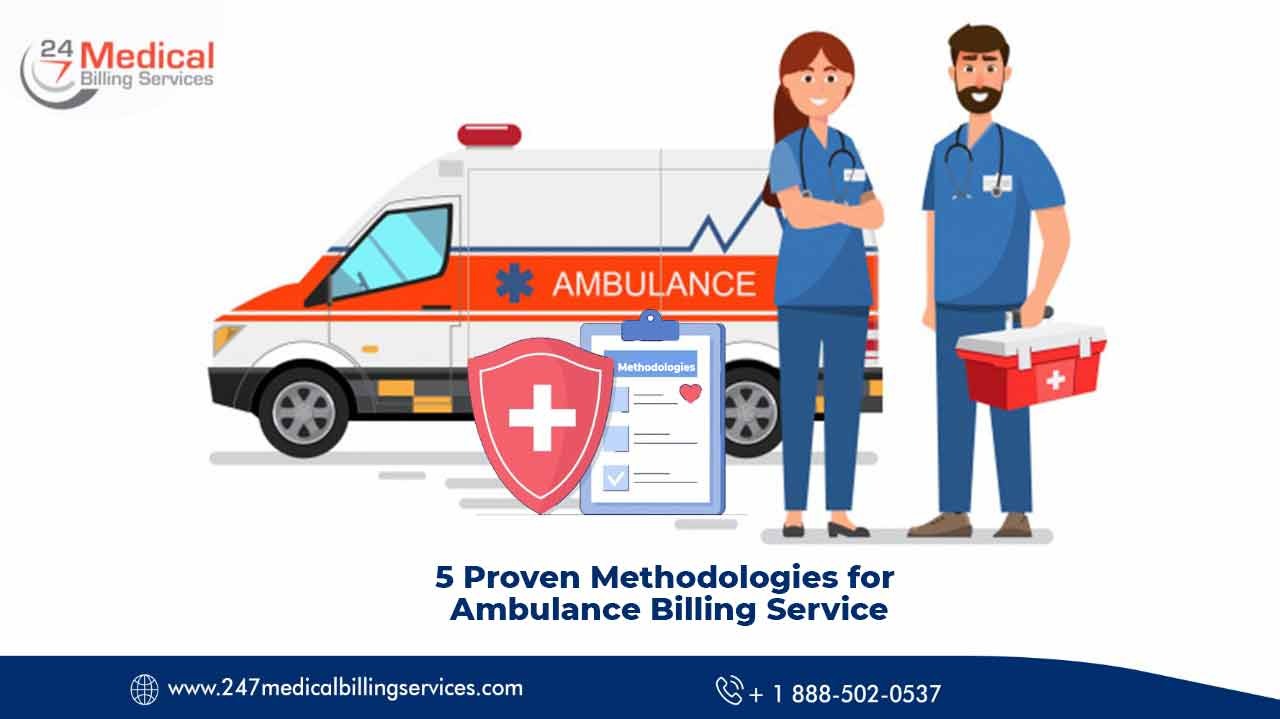
5 Proven Methodologies for Ambulance Billing Services
With the changing lifestyle of individuals and the rising number of aged populations, there has been increase in ambulance services and ambulatory care services. But simultaneously, one of the most affected areas for revenue management is the ambulance billing services in the healthcare industry. The simple reason behind failure to get 100% reimbursement for the rendered services is the in-house billing team and more focus on saving the life of the patients (which should be the case) with failure to handle the revenue processing and collection for the services. Here are some proven Methodologies for Ambulance Billing Services.
As a result, the reimbursement decreases significantly from the insurers, both public and private, while the business cost of medical care is growing. Also, the increase in the federal government's involvement is impacting the compensation.
Added to this, the Affordable Care Act and other monetary limitations will continue to dwindle the ambulance services if they do not adhere to the time and fee schedules and the changing guidelines of the payers. Hence, ambulatory care must look into ambulance billing management and revenue cycle management to tackle the low to no-payment issues.
Here are five proven Methodologies for ambulance billing services to ensure the service provider benefits while serving the community.
1: Checklist & Validation
You need to put in place a system that will ensure mistake-free EMS claim submission. In addition, it will provide an efficiently managed and smooth running of the payments. The hassle-free submission system starts with having the correct details about the dispatch and the ePCR or the patient being carried to the facility.
The data entered for every step must be validated so that when the claim is ready for submission, the data is easily QA'd, so the processing time is minimized.
The initial setup of the ePCR software must be done in consultation with a professional biller from the ambulance billing department. They will help the facility configure the software, input and validate the data, and maintain adherence to the ambulance billing checklists and regulations. As part of the process, the staff must be trained in checking to list and validating the ambulance billing claims.
2: QA (Quality Assurance) Check
There should be a comprehensive cycle of ambulance billing QA for every EMS operation. For a QA check, you would need a specialist who can ensure a consistent and clear QA process is followed for the entire workflow of EMS.
The job of QA cycle management also entails checking denials and rejections, which can help isolate issues that result in denials. In addition, the process assists in correcting the reasons for the denials and claim refusals so the documenting process can be corrected in the future, ensuring the same mistakes don't happen.
For this, you need to train your staff, and they need to keep up-to-date with all the ambulance billing and coding changes of CMS. It will then ensure a quick and error-free billing submission for the ambulance service.
3: Documentation Collection, Implementation, and Sharing
One of the primary reasons for denials and claim rejections in ambulance billing is the failure to provide proper supporting documents. Any missing documents from the medical necessity forms, pre, and post-authorization, and transportation will lead to claim delay, denial, or rejection. Moreover, each of these documents must have the necessary signatures, which can be challenging at times due to the patient's condition.
Additionally, there can be difficulty in getting the provider's signature, referring, and/or receiving agency. A single missing signature will result in getting the claim rejected. Hence, it is essential to integrate the EMS software, which will help obtain, process, and share the supporting documents across the EMS operation.
4: Focus On Unpaid Billing
Ambulance providers must take special care and focus on unpaid bills. It will help them break even in operation and keep a check on the security and other regulatory requirements for providing optimum healthcare. It is vital they learn from the mistakes that result from incorrect data entry, inaccurate ambulance coding, and billing. Also, the staff must do a regular follow-up for the submitted bills. This can help in ensuring prevention from losing thousands of dollars.
5: Optimizing Revenue Cycle Management
It is of utmost importance that the ambulatory practices have an RCM team to take care of all the timely collections. Also, they must be able to write a customized report that will include the financial metrics of the practice. The team must also be responsible for the fee schedules and workflow augmentation.
Furthermore, it is the team's job to be proactive with the management team to keep all the updates on the reimbursement changes, so there are no delays in the ARs. It must be reduced on a continued basis with timely compensation.
How to Manage the Ambulance Billing Services?
It is best to bring in a professional service provider such as 24/7 Medical Billing Services, specializing in the methodologies for ambulance billing services. While the practice can take care of the patients, 24/7 Medical Billing Services as an outsourced medical billing company will take care of the revenue cycle management. In addition, we help the facility with the latest EMS software that helps in integrating all the data and documentation to ensure proper claims while reducing rejections.
Read more: Understanding The Complexity Of Ambulance Billing Services

.png)